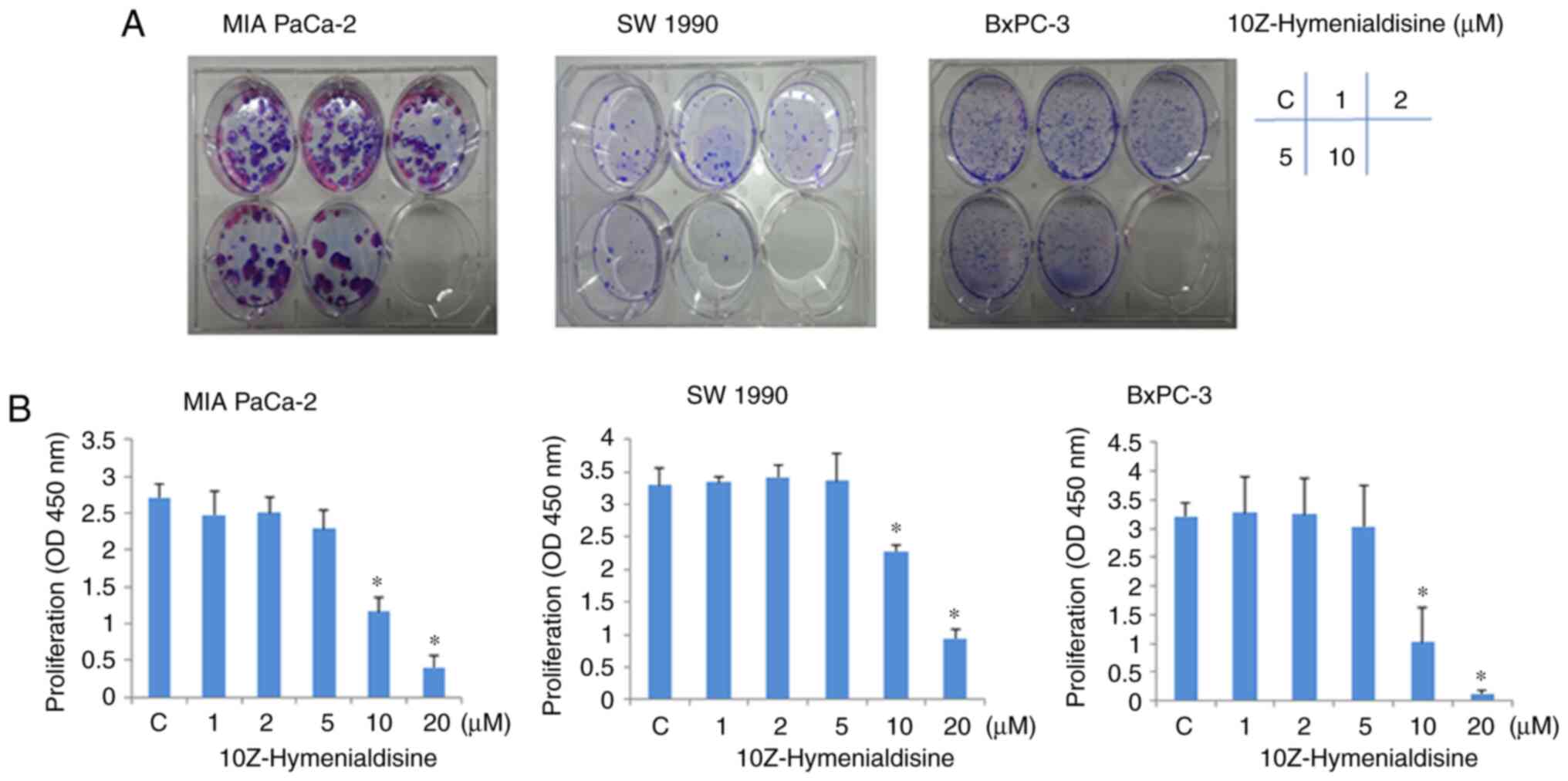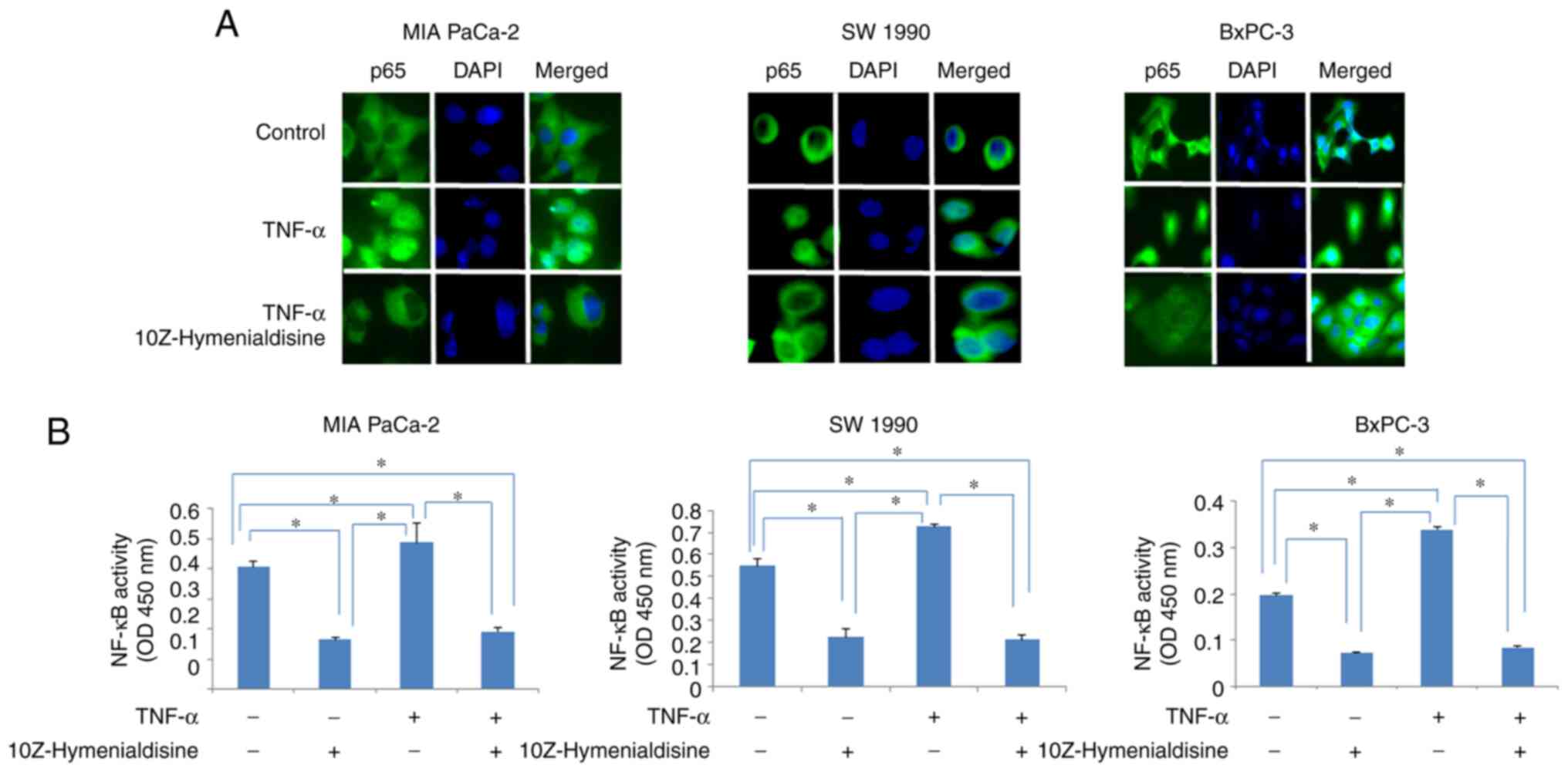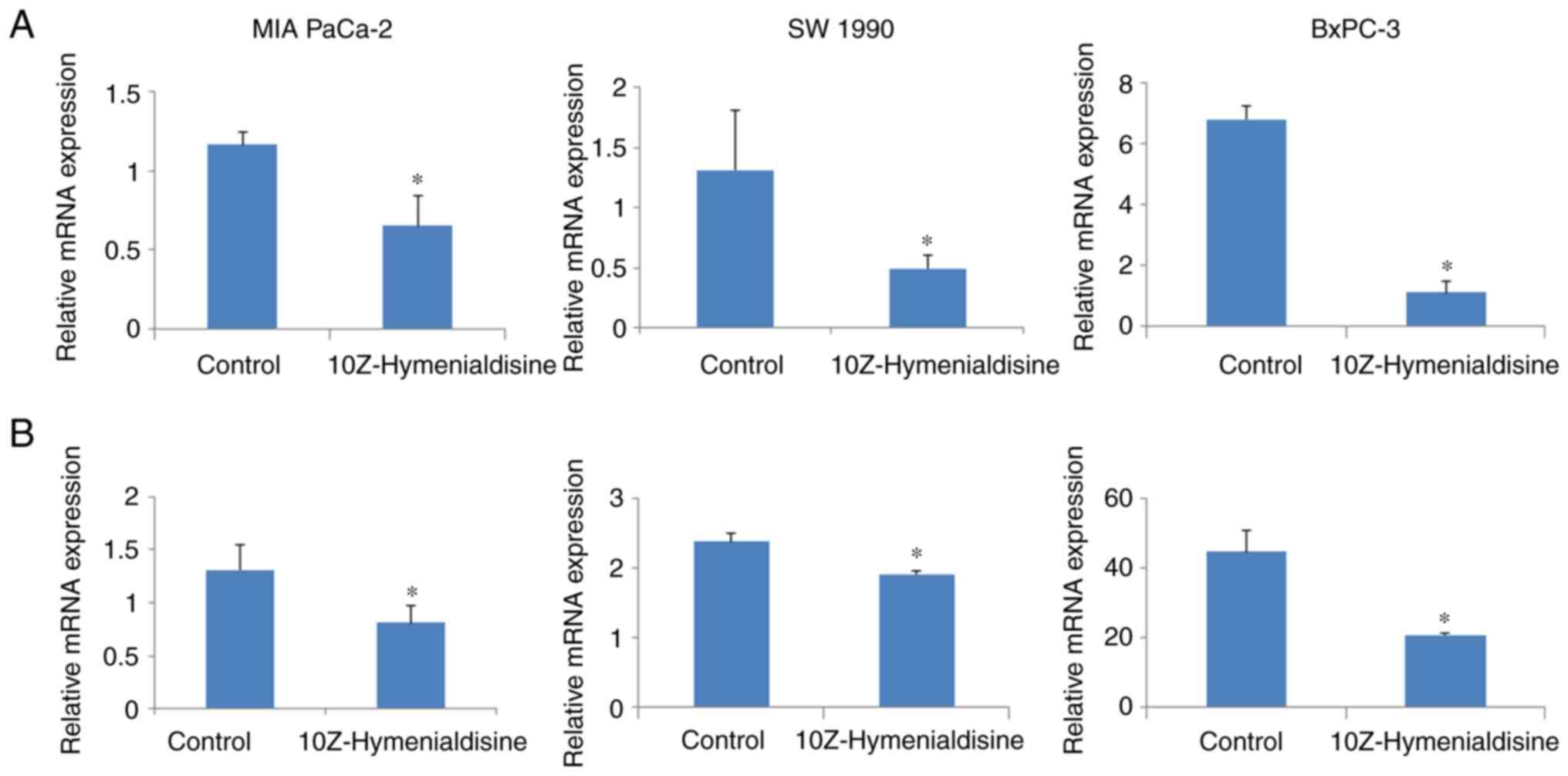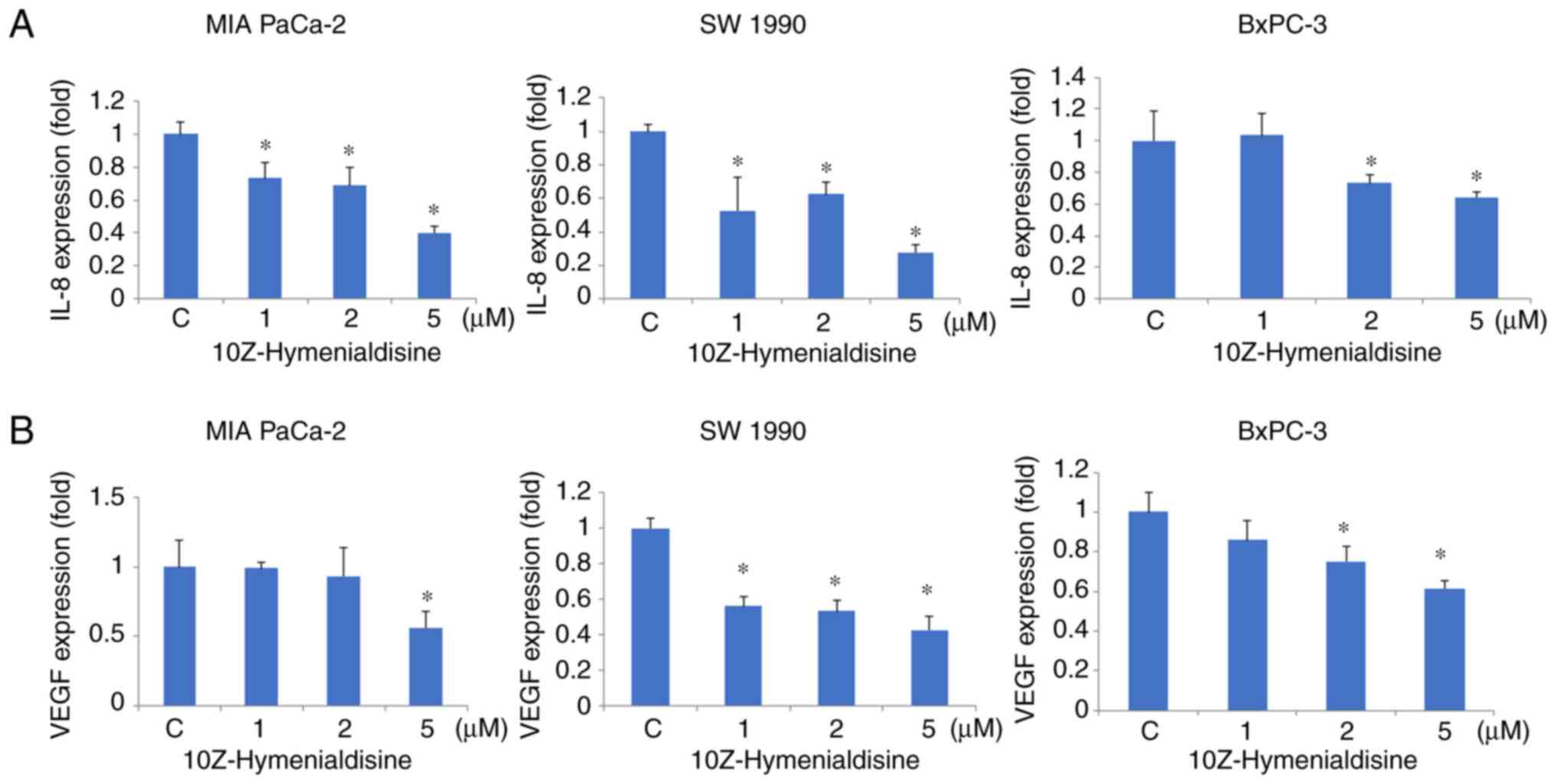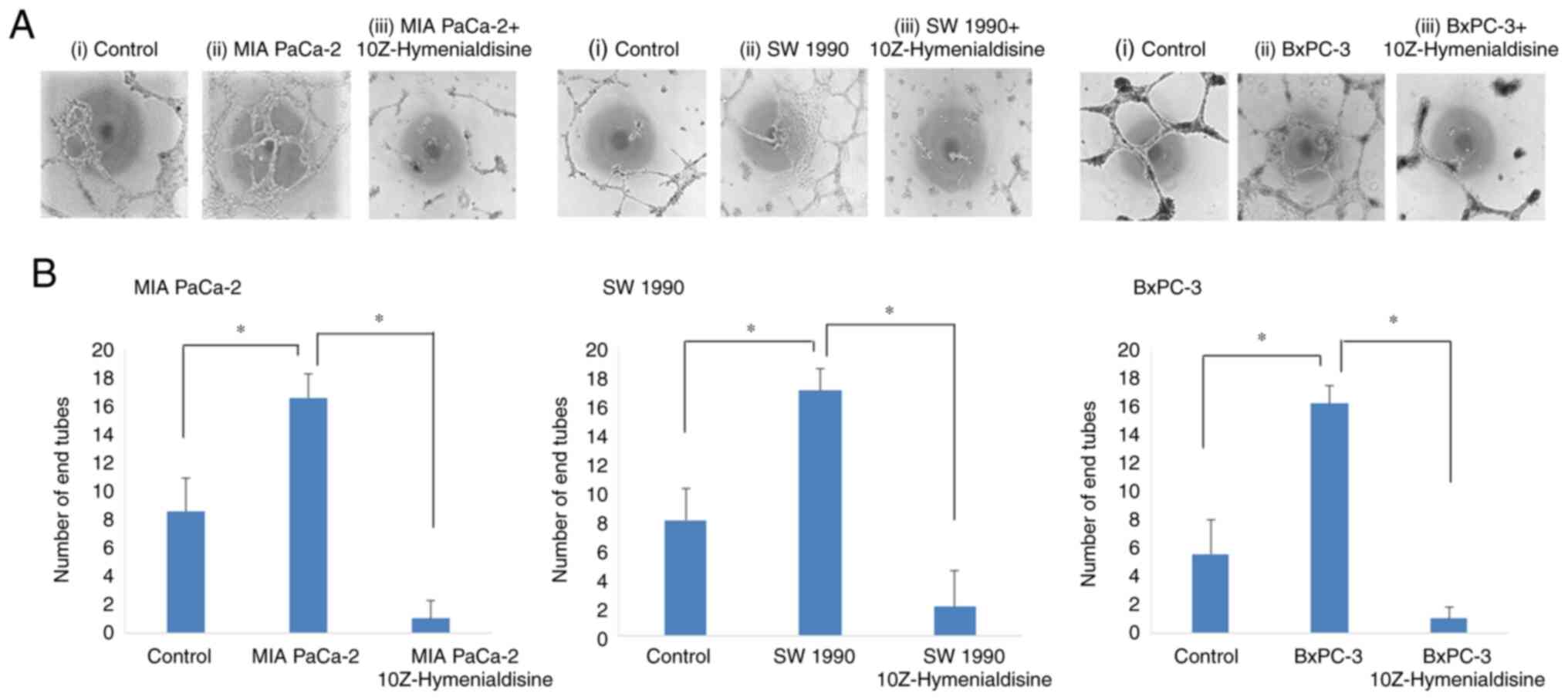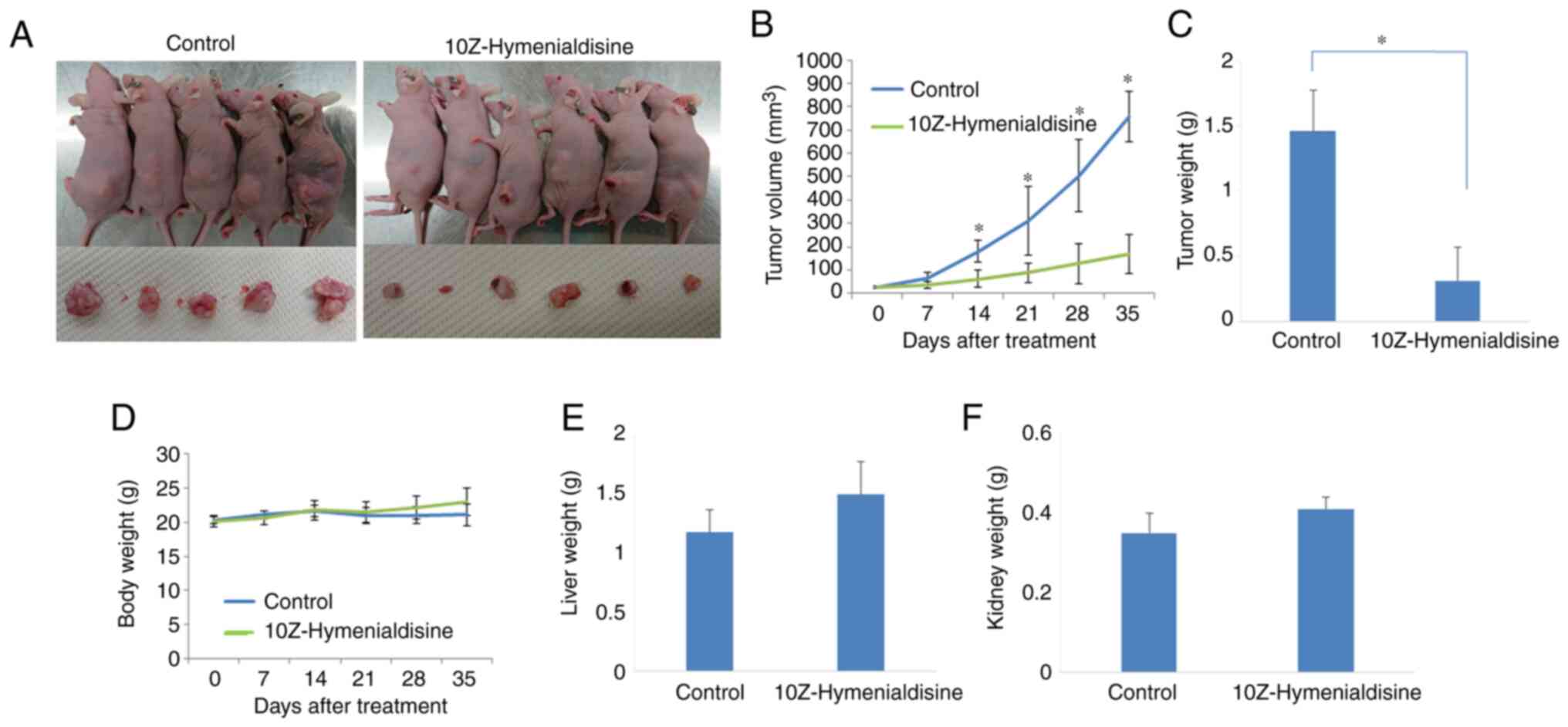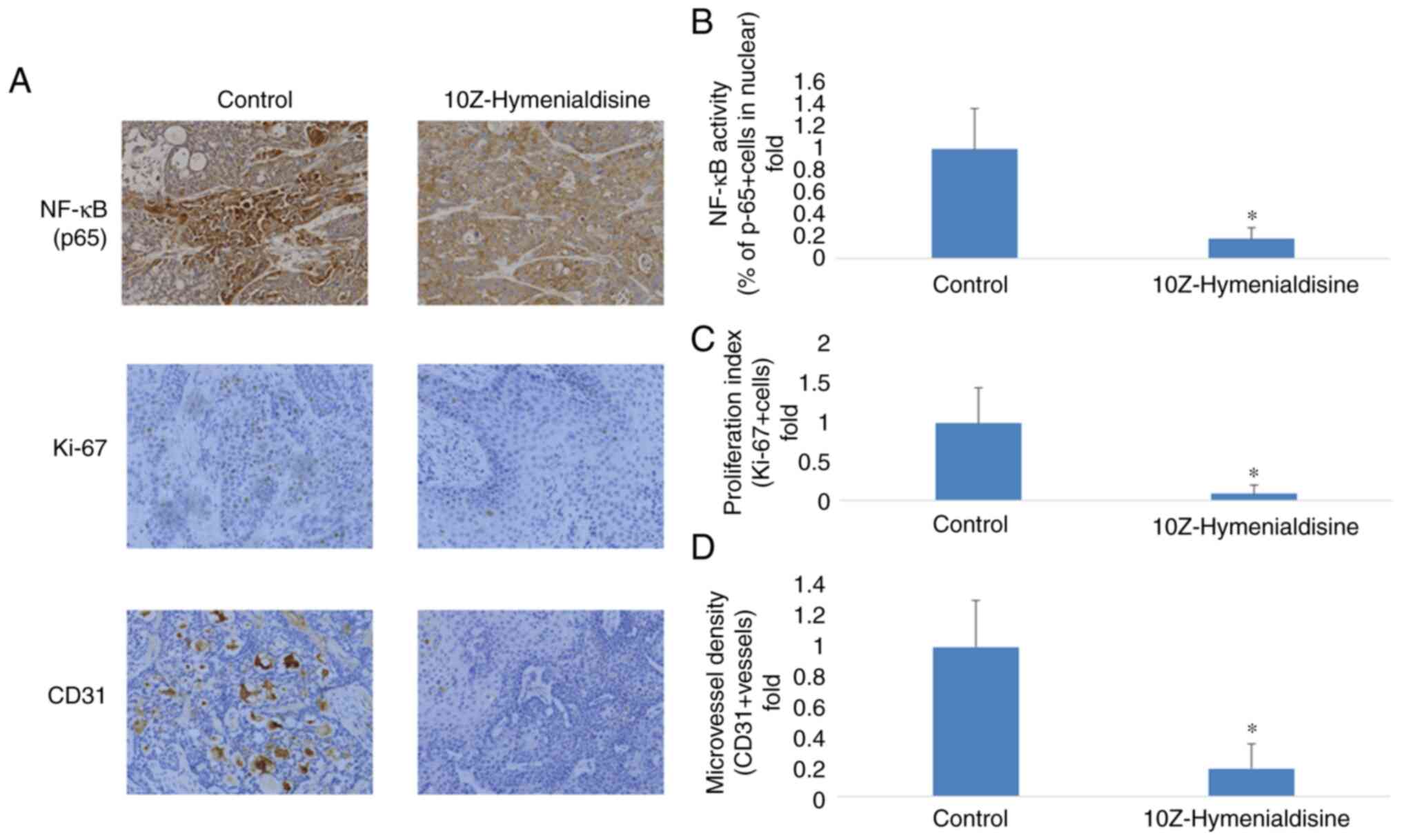|
1
|
Siegel RL, Miller KD and Jemal A: Cancer
statistics, 2020. CA Cancer J Clin. 70:7–30. 2020. View Article : Google Scholar : PubMed/NCBI
|
|
2
|
Bray F, Ferlay J, Soerjomataram I, Siegel
RL, Torre LA and Jemal A: Global cancer statistics 2018: GLOBOCAN
estimates of incidence and mortality worldwide for 36 cancers in
185 countries. CA Cancer J Clin. 68:394–424. 2018. View Article : Google Scholar : PubMed/NCBI
|
|
3
|
Siegel RL, Miller KD and Jemal A: Cancer
statistics, 2019. CA Cancer J Clin. 69:7–34. 2019. View Article : Google Scholar : PubMed/NCBI
|
|
4
|
GBD 2017 Pancreatic Cancer Collaborators,
. The global, regional, and national burden of pancreatic cancer
and its attributable risk factors in 195 countries and territories,
1990-2017: A systematic analysis for the global burden of disease
study 2017. Lancet Gastroenterol Hepatol. 4:934–947. 2019.
View Article : Google Scholar : PubMed/NCBI
|
|
5
|
Rahib L, Smith BD, Aizenberg R, Rosenzweig
AB, Fleshman JM and Matrisian LM: Projecting cancer incidence and
deaths to 2030: The unexpected burden of thyroid, liver, and
pancreas cancers in the United States. Cancer Res. 74:2913–2921.
2014. View Article : Google Scholar : PubMed/NCBI
|
|
6
|
Vincent A, Herman J, Schulick R, Hruban RH
and Goggins M: Pancreatic cancer. Lancet. 378:607–620. 2011.
View Article : Google Scholar : PubMed/NCBI
|
|
7
|
Klein AP, Brune KA, Petersen GM, Goggins
M, Tersmette AC, Offerhaus GJA, Griffin C, Cameron JL, Yeo CJ, Kern
S and Hruban RH: Prospective risk of pancreatic cancer in familial
pancreatic cancer kindreds. Cancer Res. 64:2634–2638. 2004.
View Article : Google Scholar : PubMed/NCBI
|
|
8
|
Wolpin BM, Chan AT, Hartge P, Chanock SJ,
Kraft P, Hunter DJ, Giovannucci EL and Fuchs CS: ABO blood group
and the risk of pancreatic cancer. J Natl Cancer Inst. 101:424–431.
2009. View Article : Google Scholar : PubMed/NCBI
|
|
9
|
Yoo C, Hwang JY, Kim JE, Kim TW, Lee JS,
Park DH, Lee SS, Seo DW, Lee SK, Kim MH, et al: A randomised phase
II study of modified FOLFIRI.3 vs modified FOLFOX as second-line
therapy in patients with gemcitabine-refractory advanced pancreatic
cancer. Br J Cancer. 101:1658–1663. 2009. View Article : Google Scholar : PubMed/NCBI
|
|
10
|
Oettle H, Riess H, Stieler JM, Heil G,
Schwaner I, Seraphin J, Görner M, Mölle M, Greten TF, Lakner V, et
al: Second-line oxaliplatin, folinic acid, and fluorouracil versus
folinic acid and fluorouracil alone for gemcitabine-refractory
pancreatic cancer: Outcomes from the CONKO-003 trial. J Clin Oncol.
32:2423–2429. 2014. View Article : Google Scholar : PubMed/NCBI
|
|
11
|
Katsuda M, Miyazawa M, Ojima T, Katanuma
A, Hakamada K, Sudo K, Asahara S, Endo I, Ueno M, Hara K, et al: A
double-blind randomized comparative clinical trial to evaluate the
safety and efficacy of dendritic cell vaccine loaded with WT1
peptides (TLP0-001) in combination with S-1 in patients with
advanced pancreatic cancer refractory to standard chemotherapy.
Trials. 20:2422019. View Article : Google Scholar : PubMed/NCBI
|
|
12
|
Ioka T, Ueno M, Ueno H, Park JO, Chang HM,
Sasahira N, Kanai M, Chung IJ, Ikeda M, Nakamori S, et al: TAS-118
(S-1 plus leucovorin) versus S-1 in patients with
gemcitabine-refractory advanced pancreatic cancer: A randomised,
open-label, phase 3 study (GRAPE trial). Eur J Cancer. 106:78–88.
2019. View Article : Google Scholar : PubMed/NCBI
|
|
13
|
Zhang Q, Lenardo MJ and Baltimore D: 30
Years of NF-κB: A blossoming of relevance to human pathobiology.
Cell. 168:37–57. 2017. View Article : Google Scholar : PubMed/NCBI
|
|
14
|
Taniguchi K and Karin M: NF-κB,
inflammation, immunity and cancer: Coming of age. Nat Rev Immunol.
18:309–324. 2018. View Article : Google Scholar : PubMed/NCBI
|
|
15
|
Matsuo Y, Sawai H, Ochi N, Yasuda A,
Sakamoto M, Takahashi H, Funahashi H, Takeyama H and Guha S:
Proteasome inhibitor MG132 inhibits angiogenesis in pancreatic
cancer by blocking NF-kappaB activity. Dig Dis Sci. 55:1167–1176.
2010. View Article : Google Scholar : PubMed/NCBI
|
|
16
|
Itakura J, Ishiwata T, Friess H, Fujii H,
Matsumoto Y, Büchler MW and Korc M: Enhanced expression of vascular
endothelial growth factor in human pancreatic cancer correlates
with local disease progression. Clin Cancer Res. 3:1309–1316.
1997.PubMed/NCBI
|
|
17
|
Shi Q, Le X, Abbruzzese JL, Peng Z, Qian
CN, Tang H, Xiong Q, Wang B, Li XC and Xie K: Constitutive Sp1
activity is essential for differential constitutive expression of
vascular endothelial growth factor in human pancreatic
adenocarcinoma. Cancer Res. 61:4143–4154. 2001.PubMed/NCBI
|
|
18
|
Shi Q, Abbruzzese JL, Huang S, Fidler IJ,
Xiong Q and Xie K: Constitutive and inducible interleukin 8
expression by hypoxia and acidosis renders human pancreatic cancer
cells more tumorigenic and metastatic. Clin Cancer Res.
5:3711–3721. 1999.PubMed/NCBI
|
|
19
|
Matsuo Y, Ochi N, Sawai H, Yasuda A,
Takahashi H, Funahashi H, Takeyama H, Tong Z and Guha S: CXCL8/IL-8
and CXCL12/SDF-1alpha co-operatively promote invasiveness and
angiogenesis in pancreatic cancer. Int J Cancer. 124:853–861. 2009.
View Article : Google Scholar : PubMed/NCBI
|
|
20
|
Matsuo Y, Sawai H, Funahashi H, Takahashi
H, Sakamoto M, Yamamoto M, Okada Y, Hayakawa T and Manabe T:
Enhanced angiogenesis due to inflammatory cytokines from pancreatic
cancer cell lines and relation to metastatic potential. Pancreas.
28:344–352. 2004. View Article : Google Scholar : PubMed/NCBI
|
|
21
|
Matsuo Y, Sawai H, Ochi N, Yasuda A,
Takahashi H, Funahashi H, Takeyama H and Guha S: Interleukin-1alpha
secreted by pancreatic cancer cells promotes angiogenesis and its
therapeutic implications. J Surg Res. 153:274–281. 2009. View Article : Google Scholar : PubMed/NCBI
|
|
22
|
Gupta SC, Kim JH, Prasad S and Aggarwal
BB: Regulation of survival, proliferation, invasion, angiogenesis,
and metastasis of tumor cells through modulation of inflammatory
pathways by nutraceuticals. Cancer Metastasis Rev. 29:405–434.
2010. View Article : Google Scholar : PubMed/NCBI
|
|
23
|
Roshak A, Jackson JR, Chabot-Fletcher M
and Marshall LA: Inhibition of NFkappaB-mediated
interleukin-1beta-stimulated prostaglandin E2 formation by the
marine natural product Hymenialdisine. J Pharmacol Exp Ther.
283:955–961. 1997.PubMed/NCBI
|
|
24
|
Breton JJ and Chabot-Fletcher MC: The
natural product Hymenialdisine inhibits interleukin-8 production in
U937 cells by inhibition of nuclear factor-kappaB. J Pharmacol Exp
Ther. 282:459–466. 1997.PubMed/NCBI
|
|
25
|
Livak KJ and Schmittgen TD: Analysis of
relative gene expression data using real-time quantitative PCR and
the 2(−Delta Delta C(T)) method. Methods. 25:402–408. 2001.
View Article : Google Scholar : PubMed/NCBI
|
|
26
|
Kanda Y: Investigation of the freely
available easy-to-use software ‘EZR’ for medical statistics. Bone
Marrow Transplant. 48:452–458. 2013. View Article : Google Scholar : PubMed/NCBI
|
|
27
|
Aggarwal BB: Nuclear factor-kappaB: The
enemy within. Cancer Cell. 6:203–208. 2004. View Article : Google Scholar : PubMed/NCBI
|
|
28
|
Shi Q, Le X, Wang B, Abbruzzese JL, Xiong
Q, He Y and Xie K: Regulation of vascular endothelial growth factor
expression by acidosis in human cancer cells. Oncogene.
20:3751–3756. 2001. View Article : Google Scholar : PubMed/NCBI
|
|
29
|
Xiong HQ, Abbruzzese JL, Lin E, Wang L,
Zheng L and Xie K: NF-kappaB activity blockade impairs the
angiogenic potential of human pancreatic cancer cells. Int J
Cancer. 108:181–188. 2004. View Article : Google Scholar : PubMed/NCBI
|
|
30
|
Li Q, Yang G, Feng M, Zheng S, Cao Z, Qiu
J, You L, Zheng L, Hu Y, Zhang T and Zhao Y: NF-κB in pancreatic
cancer: Its key role in chemoresistance. Cancer Lett. 421:127–134.
2018. View Article : Google Scholar : PubMed/NCBI
|
|
31
|
Arlt A and Schäfer H: NFkappaB-dependent
chemoresistance in solid tumors. Int J Clin Pharmacol Ther.
40:336–347. 2002. View Article : Google Scholar : PubMed/NCBI
|
|
32
|
Sebens S, Arlt A and Schäfer H: NF-kappaB
as a molecular target in the therapy of pancreatic carcinoma.
Recent Results Cancer Res. 177:151–164. 2008. View Article : Google Scholar : PubMed/NCBI
|
|
33
|
Holcomb B, Yip-Schneider M and Schmidt CM:
The role of nuclear factor kappaB in pancreatic cancer and the
clinical applications of targeted therapy. Pancreas. 36:225–235.
2008. View Article : Google Scholar : PubMed/NCBI
|
|
34
|
Folkman J: Angiogenesis and angiogenesis
inhibition: An overview. EXS. 79:1–8. 1997.PubMed/NCBI
|
|
35
|
Chen D, Frezza M, Schmitt S, Kanwar J and
Dou QP: Bortezomib as the first proteasome inhibitor anticancer
drug: Current status and future perspectives. Curr Cancer Drug
Targets. 11:239–253. 2011. View Article : Google Scholar : PubMed/NCBI
|
|
36
|
Tsuboi K, Matsuo Y, Shamoto T, Shibata T,
Koide S, Morimoto M, Guha S, Sung B, Aggarwal BB, Takahashi H and
Takeyama H: Zerumbone inhibits tumor angiogenesis via NF-κB in
gastric cancer. Oncol Rep. 31:57–64. 2014. View Article : Google Scholar : PubMed/NCBI
|
|
37
|
Aggarwal BB, Van Kuiken ME, Iyer LH,
Harikumar KB and Sung B: Molecular targets of nutraceuticals
derived from dietary spices: Potential role in suppression of
inflammation and tumorigenesis. Exp Biol Med (Maywood).
234:825–849. 2009. View Article : Google Scholar : PubMed/NCBI
|
|
38
|
Harikumar KB, Sung B, Tharakan ST, Pandey
MK, Joy B, Guha S, Krishnan S and Aggarwal BB: Sesamin manifests
chemopreventive effects through the suppression of NF-kappa
B-regulated cell survival, proliferation, invasion, and angiogenic
gene products. Mol Cancer Res. 8:751–761. 2010. View Article : Google Scholar : PubMed/NCBI
|
|
39
|
Omi K, Matsuo Y, Ueda G, Aoyama Y, Kato T,
Hayashi Y, Imafuji H, Saito K, Tsuboi K, Morimoto M, et al: Escin
inhibits angiogenesis by suppressing interleukin-8 and vascular
endothelial growth factor production by blocking nuclear factor-κB
activation in pancreatic cancer cell lines. Oncol Rep. 45:552021.
View Article : Google Scholar : PubMed/NCBI
|
|
40
|
Saito K, Matsuo Y, Imafuji H, Okubo T,
Maeda Y, Sato T, Shamoto T, Tsuboi K, Morimoto M, Takahashi H, et
al: Xanthohumol inhibits angiogenesis by suppressing nuclear
factor-κB activation in pancreatic cancer. Cancer Sci. 109:132–140.
2018. View Article : Google Scholar : PubMed/NCBI
|
|
41
|
Kunnumakkara AB, Guha S, Krishnan S,
Diagaradjane P, Gelovani J and Aggarwal BB: Curcumin potentiates
antitumor activity of gemcitabine in an orthotopic model of
pancreatic cancer through suppression of proliferation,
angiogenesis, and inhibition of nuclear factor-kappaB-regulated
gene products. Cancer Res. 67:3853–3861. 2007. View Article : Google Scholar : PubMed/NCBI
|
|
42
|
Sharma V, Lansdell TA, Jin G and Tepe JJ:
Inhibition of cytokine production by Hymenialdisine derivatives. J
Med Chem. 47:3700–3703. 2004. View Article : Google Scholar : PubMed/NCBI
|
|
43
|
Dobretsov S, Tamimi Y, Al-Kindi MA and
Burney I: Screening for anti-cancer compounds in marine organisms
in Oman. Sultan Qaboos Univ Med J. 16:e168–e174. 2016. View Article : Google Scholar : PubMed/NCBI
|
|
44
|
Stipa F, Lucandri G, Limiti MR, Bartolucci
P, Cavallini M, Di Carlo V, D'Amato A, Ribotta G and Stipa S:
Angiogenesis as a prognostic indicator in pancreatic ductal
adenocarcinoma. Anticancer Res. 22:445–449. 2002.PubMed/NCBI
|
|
45
|
Benckert C, Thelen A, Cramer T, Weichert
W, Gaebelein G, Gessner R and Jonas S: Impact of microvessel
density on lymph node metastasis and survival after curative
resection of pancreatic cancer. Surg Today. 42:169–176. 2012.
View Article : Google Scholar : PubMed/NCBI
|
|
46
|
Amin Z, Theis B, Russell RC, House C,
Novelli M and Lees WR: Diagnosing pancreatic cancer: The role of
percutaneous biopsy and CT. Clin Radiol. 61:996–1002. 2006.
View Article : Google Scholar : PubMed/NCBI
|
|
47
|
Annese T, Tamma R, Ruggieri S and Ribatti
D: Angiogenesis in pancreatic cancer: Pre-clinical and clinical
studies. Cancers (Basel). 11:3812019. View Article : Google Scholar : PubMed/NCBI
|
|
48
|
Zhang Z, Ji S, Zhang B, Liu J, Qin Y, Xu J
and Yu X: Role of angiogenesis in pancreatic cancer biology and
therapy. Biomed Pharmacother. 108:1135–1140. 2018. View Article : Google Scholar : PubMed/NCBIPubMed/NCBIPubMed/NCBIPubMed/NCBIPubMed/NCBIPubMed/NCBI
|















